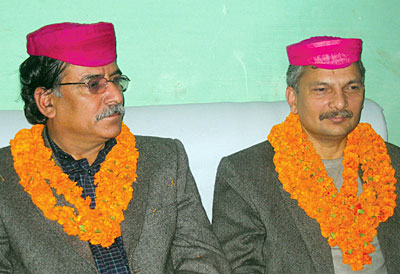 |
Even as professional Maoist baiters take great delight in the latest public spat within the party, it is almost impossible to conceive of a successful conclusion to the peace and constitutional process till Pushpa Kamal Dahal and Baburam Bhattarai revive their partnership, or at least develop a working relationship again.
But this will be an enormous challenge given the deep personal and political rift between the top two leaders. Sources inside and outside the party who have had conversations with both the leaders on the issue have given us a peek into the depth of resentment. Here is Prachanda's version: Bhattarai never treated me with respect, he is arrogant and thinks he is smarter than everyone else just because he topped the school board exams, his relations with India are deeply suspect and Delhi is using him to stoke divisions, he does no organisational work, he wants to create an alternative power centre in the party and become PM, his public statement undermining my candidature right after proposing my name as PM was the breaking point, his contribution to the movement is genuine, but now he is willing to make too many compromises with revisionist forces.
Bhattarai obviously has a different story to tell: I have never challenged the chairman and his leadership position within the party, he believes in a use-and-throw policy and has instead worked to isolate and undercut me; he is behaving as the next Gyanendra and wants to concentrate all powers and finances, I do not want to be PM but when there was a possibility of consensus under my leadership, he blocked it and filed his candidature instead; he is conspiratorial in his functioning and is now collaborating with royalists, I am not given any organizational responsibilities to prevent contact with the cadre, he is a petty pragmatist who vacillates between different streams, he knows a people's revolt is not possible and has privately assured India he is willing to do anything to become PM, but is dishonest in public about it and instead branded me an Indian stooge.
Add to this the genuine differences over the political line.
Bhattarai is not in favour of 'surrender'. Given his deep ideological commitment to Marxism and Maoism, he is in fact least likely to make any fundamental compromises in the party line or organisational structure. Indian and NC negotiators from the 2005-07 days often recount how it was easier to deal with Prachanda than Bhattarai. But he recognises the limits of the political moment, how a 'revolution' before its time is doomed to fail, and is willing to make major compromises to institutionalise a secular, federal, republican Nepal and then focus on the economy.
Prachanda however wants to keep his options open. To be fair, this could be because unlike Bhattarai, he has to deal with internal party pressures, restive PLA commanders, and reconcile conflicting viewpoints while maintain party unity. But there is also clearly an overwhelming element of personal ambition: "If you make me PM, constitution and peace can take place, if not, be ready for a revolt." This duplicity only helps strengthen those who want to keep the Maoists out of the power structure.
The real crisis in the relationship, however, is the breaking down of the old compact. 'Prachanda's leadership, Bhattarai's line' was the principle till 2008. Now, Prachanda's leadership is no longer unquestioned, and Bhattarai's line has been sidelined. Till that old compact is revived, or a new arrangement worked out, the party will remain deeply divided.
In early 2010, the columnist Adtiya Adhikari and I travelled with Dr Bhattarai to his constituency in Gorkha. During a walk back from a village where he was addressing a mass gathering to the main highway, we asked him whether differences could lead to a split in the party. His reply is worth quoting in full: "Between 1960 and 1990, many people left the NC and formed small groups. But there was no vertical split because NC was not a party, but a movement. Individuals may leave and form splinter outfits, but there will be no split because the Maoists are not merely a party. It is still a movement."
If the movement has to find its way, it is time for Prachanda to make a phone call and make peace with Bhattarai over several long one-on-one meetings. Otherwise, history will not judge them kindly.
READ ALSO:
Dahal on war path again, EDITORIAL
Question for Comrade Lohani, DAMAKANT JAYSHI



